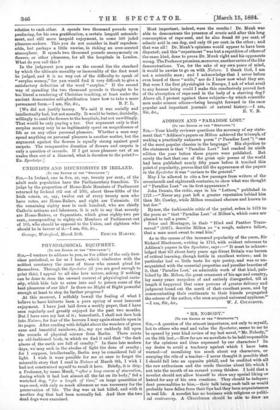ADDISON AND " PARADISE LOST."
[TO THE EDITOR OF THE " SPECTATOR."]
SIR,—Your kindly reviewer questions the accuracy of my state- ment that " Addison's papers on Milton achieved the triumph. of
making a practically unknown poem" (" Paradise Lost") "one of the most popular classics in the language." His objection to the statement is that " Paradise Lost" had reached its ninth edition the year before these papers were published. But surely the fact that one of the great epic poems of the world had been published nearly fifty years before it touched this point of popularity, proves that till the appearance of the papers in the Spectator it was " caviare to the general."
May I be allowed to cite a few passages from writers of the- seventeenth and eighteenth centuries, to show what was thought of " Paradise Lost " on its first appearance P John Dennis, the critic, says in his "Letters," published in 1721 :—"Never any poet left a greater reputation behind him than Mr. Cowley, while Milton remained obscure and known to but few."
Rymer, the fashionable critic of the period, refers in 1678 to- the poem as " that 'Paradise Lost' of Milton's, which some are- pleased to call a poem."
Prior and Montague, in their " Hind and Panther Trans- versed" (1687), describe Milton as "a rough, unhewn fellow,. that a man must sweat to read him."
As to the causes of the increased popularity of the poem, Sir Richard Blackmore, writing in 1716, with evident reference to Addison's papers in the Spectator, says :—" It must be acknow- ledged that till about forty years ago Great Britain was barren. of critical learning, though fertile in excellent -writers ; and in particular had so little taste for epic poetry, and was so un- acquainted with the essential properties and peculiar beauties of it, that 'Paradise Lost,' an admirable work of that kind, pub- lished by Mr. Milton, the great ornament of his age and country,. lay many years unspoken of and entirely disregarded, till at length it happened that some persons of greater delicacy an& judgment found out the merit of that- excellent poem, and by communicating their sentiments to their friends propagated the esteem of the author, who soon acquired universal applause.'


































 Previous page
Previous page